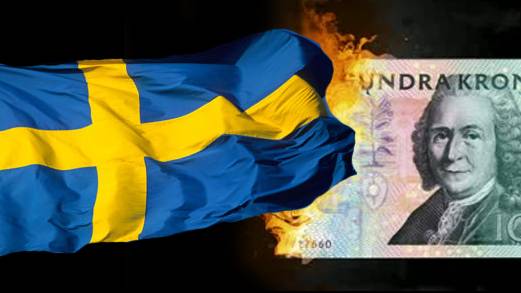Sweden moves closer to a cashless society with new money laundering registry
Source: infowars.com

Effort to restrict the use of physical money is a further step towards a modern day fascism in the Scandinavian country
On October 1st the Swedish government posted new regulations on its site bolagsverket.se (“corporation agency”) which prohibits citizens from engaging in certain business activity without registering with authorities and paying a fee of close to 100 EUR (850 SEK). Three regional administrations have been selected to supervise and maintain the registry which affects private firms as well as limited companys (LLC/INC). It also applies to foreign corporations that have a branch in Sweden.
Running a business in Sweden in any of these areas is now prohibited without being on the government registry and paying the fee:
- accounting/bookkeeping
- tax advising
- legal counseling concerning the sale of real estate and corporate entities
- law firms that create, sell and mediate corporate entities
- any business activity that involves a single cash transaction of 15000 EUR or more (the government cites car dealers, jewelers and anyone who deals with watches and antiques as a subject to the new regulations)
The troublesome legislation does not end with a government registry and yet another extraction of resources from the citizens. Businesses must now in many cases also violate the privacy of its customers. According to the law “Act (2009:62) on actions against against money laundering and financial aid of terrorism” businesses or their employees must obtain detailed knowledge about its customers and also ask for their identification. Any suspicious activity should be reported to the financial police. Funnily enough businesses does not have to obtain knowledge about their customers if they are dealing with Swedish authorities or with banks and insurance companies. Article 2 section 5 of the law states that these are exempt. Customers that use electronic money to a value of less than 2500 EUR per year are also exempt from further scrutinizing. Cardealers are able to stay out of the registry if they only accept credit/debit cards or electronic bank transfers. The assault is mainly on cash, the real physical money that we can store privately and share with each other without governments and banks knowing about it. Section 6 states that measures should be taken in order to avoid the possibility for a customer to act anonymously. As high risk transactions are listed all transactions that are made from a distance. In these cases the business owners or its employees have to obtain specific knowledge on the origins of the money that are used to complete the transaction. They also have to obtain as much information as they need to make an assessment of the customers business operations whether it is a corporation or a private citizen they are dealing with. They should also assess what kind of control mechanisms the customer is using in order to avoid money laundering or the financial aid of terrorism. Article 3 section 4 prohibits business owners, the board of directors or an employee to talk to the customer or any outsider about the fact that they have collected data about the transaction or given any details to authorities. All transactions should be documented and stored for a minimum of 5 years. Each company need to have a system up and running where specific information is quickly extracted and given to authorities on demand. The regional administrations in charge of creating the registry are already contacting businesses around the country and calling for them to pay the fee and submit their details to the government database. Exactly how the registry and the fee would work against money laundering and terrorism is not told. The Swedish authorities already have a huge registry of all corporations and their owners, where the businesses also are divided into so called SNI codes (different types of commercial activity). So this kind of database could easily have been constructed on existing information.
A few small business owners have voiced their concerns about the breach of privacy and the worsening bureacracy, but the topic as a whole has not caused a great debate in the country. The Swedish society has been an experiment (a great demoralization process) for the cashless society for a long time and people don’t seem to see the dangers of having a highly centralized system with the banks, the government and the EU in total control of the nations money.
The Swedish government lost the country to lobbyism a long time ago and with the EU the degradation of national sovereignty is set to get worse in the future. Both the Swedish state and the population on average holds a large debt to the banks. The population is mainly divided in two categories. The highly indebted taxation class and the increasing dependent class. At the same time multinational corporations are let in to extract resources from the the mining industry as well as taking over the electronic grid which has made the power prices skyrocket. When the state and big business are in collusion like this doesn’t that look like fascism?






















